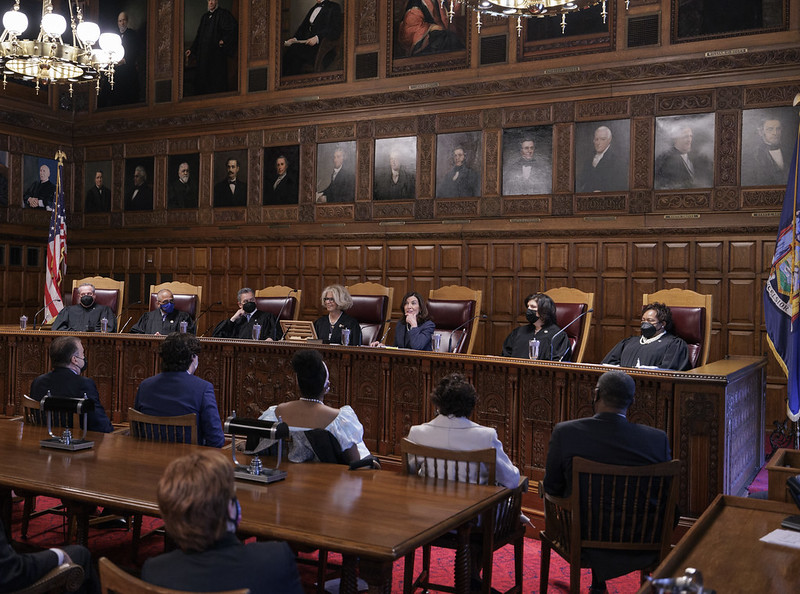
Gov. Hochul at the Court of Appeals (photo: Mike Groll/Governor's Office)
As we sat together in a Brooklyn backyard, we examined shared circumstances: all of us were convicted of serious crimes that caused immeasurable harm, received a life sentence, and served decades behind bars. Now, all of us have much to be thankful for – we each had our sentence commuted through clemency. Collectively, we reflect on the many people still in prison who merit the same consideration.
Each of us has been doing all we can to re-integrate into our families, communities, and society at-large. We tend to loved ones who are elderly and ailing. We work and engage with social justice organizations that provide support for incarcerated women and their children, and with case management services for formerly incarcerated persons. We help organize impacted communities in efforts to secure legislative reform around the pernicious effects of mass incarceration.
Gubernatorial grants of clemency -- the official recognition of redemption -- bring much needed hope to those in prison. Every time a sentence is commuted, it reverberates across correctional facilities. Those who may have resigned themselves to life in prison now leave their cells eager to focus inward on areas of growth through education and by participating in and developing programs to benefit themselves and others.
While granting clemency sends a clear message of hope, the converse is also true. When New York Governor Andrew Cuomo in 2015 and then again in 2017 rolled out a clemency project, anticipation spread like wildfire to people inside and their families outside that the governor would use his vast constitutional clemency power on an ongoing basis. And yet, we are among the fortunate few to reap the benefits of clemency.
To people serving massive prison sentences, false hope of the potential for release is often worse than no hope. The unwillingness to grant clemency to those who accept and acknowledge responsibility for the harm they caused, who have worked so hard to repair and transform, and who have been incarcerated for decades, magnifies the feelings of despair and futility that pervade prison life.
We know we are not special. We are first-hand witnesses to the many men and women who have used their time in prison to grow, improve, mentor others, and atone; to take stock of who they are and what brought them to prison. We know how much these men and women have to offer to everyone on the outside. Yet due to a criminal legal system that regularly inflicts massive, death-by-incarceration sentences, they face the reality of perishing in prison despite no longer in any way resembling the person they were decades earlier when they were first incarcerated.
New York Governor Kathy Hochul, in similar fashion to former Governor Cuomo, raised hopes when she promised to devote more resources to clemency and to issue grants on a regular basis rather than the typical once-a-year December announcement. We know too well the crushing disappointment when December 31 would come and go with at best a few people receiving clemency. The resulting anguish is palpable and is manifested by decreased involvement in various programs and activities, as people surrender to the reality of dying behind bars.
Governor Hochul’s clemency website provides that applicants should demonstrate “exceptional strides in self-development and improvement.” We know numerous people who meet and far surpass that criterion. We also know people serving life sentences for crimes committed when they were as young as 15 years old. We know people who are now in their seventies and eighties. We know people who are gravely ill. We know people who have selflessly devoted themselves to others in prison through hospice care, as mobility aides, and as sign language interpreters. And we know numerous people who have served 30, 40, or more years and present no threat to public safety. In fact, public safety would be improved if more people were returned to their families and communities.
We have banded together to amplify our voices. We call ourselves the Clemency Collective and hope that Governors will heed our message. Along with promising clemency on an ongoing basis, Governor Hochul created a clemency advisory panel. We hope the governor will also turn to us as a clemency resource. We know what it takes to prosper in the harsh confines of prison and the many challenges that people inside face every day. We have experience-based suggestions for how to improve the clemency process; to make it transparent and accessible so that it will inspire and motivate those inside to pursue life-affirming goals, as well as provide confidence to those in the community at-large that successful applicants for clemency are ready and able to safely re-enter and contribute to society. In the meantime, we raise our collective voice to implore Governor Hochul to fulfill her promise and begin granting clemency on a regular basis.
The Clemency Collective:
Colin Absalom
Roy Bolus
Ulysses Boyd
Richard Chalk
Judy Clark
Paul Clark
Rodrick Cole
Robert Ehrenberg
David Gilbert
Andre Jenkins
Gregory Mingo
Arnold Raimondo
Alfonzo Riley
Monica Szlekovics
Jon Adrian Velazquez
***
Have an op-ed idea or submission for Gotham Gazette? Email This email address is being protected from spambots. You need JavaScript enabled to view it.




